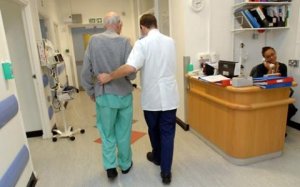GPs and Enhanced Recovery
Enhanced recovery, sometimes known as fast-track, rapid or accelerated recovery, ensures patients: are in the optimal condition for treatment, have the best possible care during their operation, and experience optimal post-operative rehabilitation
Enhanced recovery of surgical patients is an evidence-based approach involving a selected number of evidence-based interventions which, when implemented as a group, have a greater impact on outcomes. For all this to happen, four elements are essential.
- 1. Improving pre-operative care and optimisation
- 2. Reducing the physical stress of the operation
- 3. Increasing comfort post-operatively
- 4. Improving post-operative care
What can GPs do?
- 1. Review and actively manage existing long term and mental health conditions to ensure patients are as well as possible prior to surgery
- 2. Discuss treatment options and choices
- 3. Promote the patient’s understanding of their role and responsibilities in enhancing their own recovery through explaining what enhanced recovery is and giving written information
- 4. Bring more aspects of preparative care closer to home
- 5. Identify baseline health status with recordings of blood pressure, FBC and U&Es.
Criteria for the optimisation of comorbidities
1. Blood Pressure below 160/90
2. Asthma or COPD
- Peak flow or spirometry normal for individual patients
- No active chest infection
- No (or minimal) wheeze, dyspnoea or cough
- Only moderate limitations to normal physical activity (able to walk up 1 flight of stairs or 150 yards on level ground without stopping)
3. Reduced pulmonary complications
- Stop smoking (at least 4 weeks pre and post surgery)
- Weight reduction programme (ideally Body mass Index< 27kg/m2)
- Pulmonary aspiration (gastro oesophageal reflux should be treated with a PPI eg 40mg Omeprazole night before and morning of surgery)
4. Functional capacity
- Patient should be able to walk up one flight of stairs or 150 yards on level ground without cardio respiratory symptoms
- Poor mobility for reasons of arthritis, claudication, obesity etc make this assessment difficult to interpret
- Consider an exercise programme to improve functional capacity
5. Anaemia (Hb< 12g/dl women and< 13g/dl for men)
- Should be corrected prior to any elective surgery that has a potential for significant blood loss
6. Diabetes
- HbA1c< 8% within the past 3 months (Type 1 & 2)
Frequently asked questions patients ask
Do I have to stop smoking?
It is advisable that you do to enhance recovery after surgery
How much exercise do I have to do?
It doesn’t need to be intense but you must be active. The earlier you start, the better.
Why do I need carbohydrate drinks?
Drinking carbohydrate drinks before a surgical procedure has been proven to help with recovery after surgery.
What if I have health problems such as high blood pressure or diabetes? Is Enhanced Recovery for me?
You will be advised as to how to manage these conditions at all stages of the pathway, making you as fit for surgery as possible
Is recovery from ERP quick?
Yes, ERP is proven to be a model for high quality and a speedy recovery


